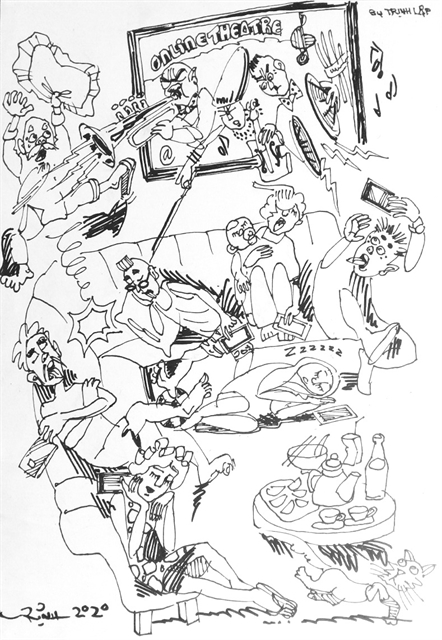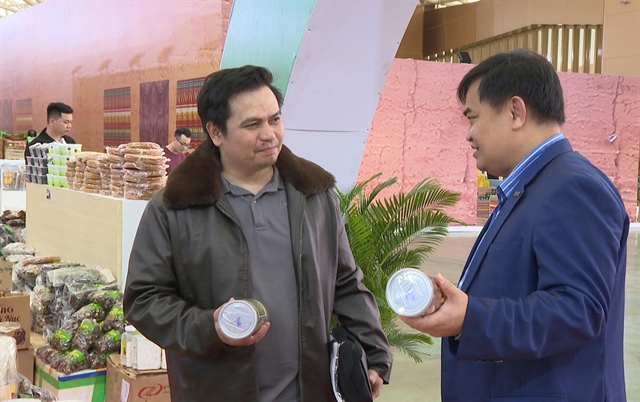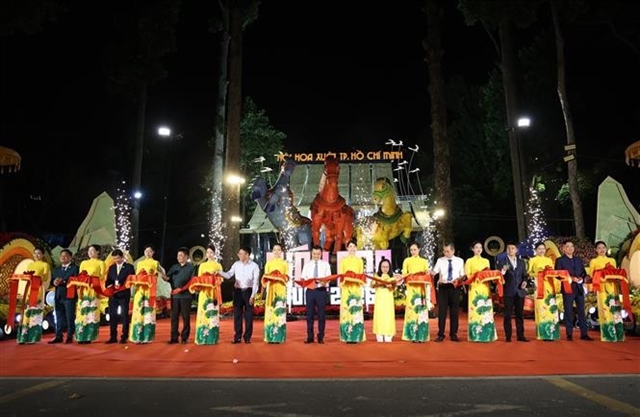 Talk Around Town
Talk Around Town

The ministry of culture is planning for an online theatre project to entertain audience, who cannot go to theatre during Covid-19 pandemic and also a way to rescue art troupes from being in debt without income from selling tickets.

|
| Illustration by Trịnh Lập |
by Lê Hương
The ministry of culture is planning to get an online theatre project off the ground, to entertain those who can’t attend in person because of COVID-19 and also as a means of helping struggling arts troupes escape from debts incurred in the absence of a paying audience.
Deputy culture minister Tạ Quang Đông recently hosted a meeting with senior officials from the ministry's Performing Arts Department regarding the project, which is viewed as a workable solution to save arts troupes while also bringing digital technology into the performing arts space.
Trần Hướng Dương, deputy director of the Performing Arts Department, said the project would not only feature existing productions but also introduce new shows if they prove suitable with digital technology.
"Selected works would include classical performances, which would likely have a great chance of success," he said.
He said he believed this would also encourage audience members to return to the theatre when the pandemic is over.
“It would be an effective means of advertising theatrical productions,” he said.
Another advantage of the online theatre project is that it would help create a database of all productions.
According to People's Artist Nguyễn Quang Vinh, acting director of the department, the project aims to support central arts troupes, as the lives of artists have been seriously disrupted by the pandemic.
The department will compile a plan for submission to ministry leaders for approval, co-operate with communications channels, seek financial aid, select a venue to record the shows, procure the necessary technical equipment, and plan a broadcasting schedule.
Vinh said the project, in its first phase, would not aim solely at financing the arts troupes.
Gradually, over the longer term, the troupes would co-operate with internet service providers to share the profits from the productions, he said.
This idea, however, has received mixed comments from those in arts circles.
Meritorious Artist Sỹ Tiến, deputy director of the Tuổi Trẻ (Youth) Theatre, said introducing traditional theatre online would not be a wholly suitable measure, though the idea of establishing an online theatre was a good idea.
“Theatre needs an audience, and artists need to interact with an audience to perform at their best,” Tiến said.
“Audiences are more familiar with attending the theatre. If they begin watching theatre online, then theatre would become a TV product.”
He added, though, that "the way TV directors set up cameras and edit films is more professional and helps create more scenes of beauty".
"But theatre has many theatrical elements that simply don’t translate to film. And showing theatre online may even have a counter effect.
“People may say: Is this really theatre? I prefer watching TV,” Tiến said.
He also doubted that the technical facilities needed for the project are available.
“We can’t catch up with foreign countries in terms of online theatre,” he said.
Tiến also wondered how income would flow to arts troupes that are part of the project.
“Single artists can attract audience members with their personal YouTube channels and some earn a profit,” he said.
“But it’s not so simple for national arts troupes with a political mission. I’m afraid they won’t get enough views to earn money on YouTube.
“We need more time to determine the technical facilities needed and also the content.”
Meritorious Ballet Artist Trần Ly Ly is worried that a long production, such as Swan Lake, may not be so appealing when broadcast online.
Music, traditional theatre, or circus performances can be divided into short items or excerpts for online broadcasts, but it’s not so straightforward with drama, ballet and opera.
“The audience may find a short excerpt hard to follow,” she said. “But by the same token, an entire play may be too long to attract viewers and retain their attention.”
Ly also expressed her concern over income for arts troupes.
“The State only pays them to stage the play,” she said. “The troupes must take care of advertising and secure other funding.
“Broadcasting online would not guarantee income, and should only be a temporary measure.”
Music programme director Việt Tú said that online arts are among many unavoidable trends at this point in time, regardless of the pandemic, but he is yet to become familiar with online performances.
Online theatrical works already performed in Việt Nam have been old productions, which are not staged solely for profit, according to Tú.
In order to sell tickets for online shows, productions must appeal to the public. Technical facilities must be able to fully support the broadcast, including having cameras in different positions to catch a character’s changing mood or situation.
Most art troupes in Việt Nam lack such facilities.
“A priceless feature of a live performance is the artists’ emotions, which may not be captured in an online broadcast,” Tú said.
Tú has been invited to co-operate with popular music programmes such as Tomorrowland, which has been launched online.
“I think nothing can replace the atmosphere at an actual performance and the emotions of the performers,” he said.
As Việt Nam does not have adequate policies on copyright, no one is sure how much people should be charged for watching online theatre. Tú was also concerned about artists’ rights.
He said he hoped that if online theatre is widely introduced the audience pay a fair sum to support the artists and producers.
The HCM City-based dramatic artist Hồng Vân has a similar opinion to Tiến regarding the quality of online theatre.
“I don’t think this project is feasible,” she said. “I personally don’t like acting online. In the theatre, artists directly interact with the audience, not indirectly via a mobile phone or computer screen.”
Vân said she believed cultural managers must carefully consider the online theatre model.
“It may damage the development of live theatre around the country and in HCM City in particular,” she said.
Meanwhile, People’s Artist Tống Toàn Thắng, deputy director of the Việt Nam Circus Federation, supports the culture ministry’s initiative.
“Online performances can promote the arts in all regions around the country and also overseas,” he said.
“Online theatre would include various types of performance art, like the circus, drama, traditional opera, and reformed opera.
“The audience just sits at home and enjoys the performance.”
If the State invests properly in technical equipment such as lighting, audio, and visual effects, so that online shows are appealing to audiences, artists such as himself are ready to head online.
Meritorious Artist Mỹ Uyên, director of Small Stage 5B Võ Văn Tần in HCM City, suggested the State would have to direct her troupe to produce a play for the project.
“I want to stress that artists can’t perform online,” she said.
“Since the first social distancing period in April, many artists have done livestreams on Facebook to sell things like food and cosmetics to earn money.
“But when they are able to return to the stage once more, they will be enthusiastic about the performance despite having financial issues. This shows that the emotions of an artist never die.”
Artists could livestream one or two scenes for fun and to interact with the audience, she believes, but not the entire production.
The theatre must remain in its traditional form and not be transformed into a more modern form.
But she would lend her support if the State funded the arts to offset the effects of the pandemic, and she had already met with HCM City Television to discuss the possibilities.
Troupes would only seek sufficient funds to stage one live show, she said, and the TV station could then broadcast it as many times as it wishes at no extra cost. VNS




